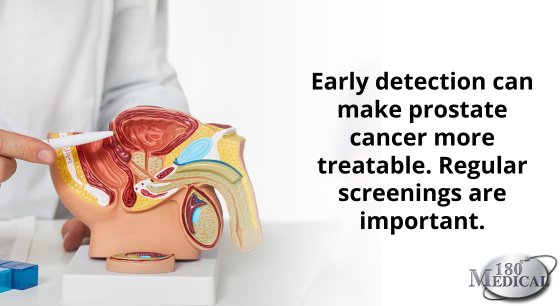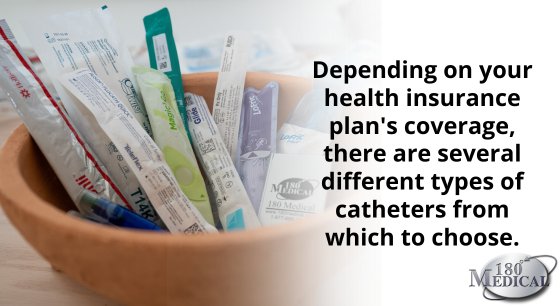
According to 2024 statistics from the American Cancer Society, over 299,000 men in the United States are diagnosed with prostate cancer annually. After prostate cancer surgery, some men may have some difficulty in managing their bladder function, experiencing issues like urinary retention or urinary incontinence. In certain cases, using catheters after prostate cancer surgery may be a viable treatment option to help maintain one’s independence and improve their overall quality of life.
September is Prostate Cancer Awareness Month, a great time to learn more about this common cancer. We’ll also review the different catheters for men and how 180 Medical can help you navigate your choices.
Ready to explore your catheter options now? Reach out to us to get started.
What is Prostate Cancer?
Prostate cancer is a type of cancer that occurs when cells in the prostate gland, a small organ that produces seminal fluid, begin to grow out of control. It’s one of the most common cancer types in men, often diagnosed in males over 50.
While some forms of prostate cancer are slow-growing, others can be more aggressive and may require more intense treatment.
Early detection is crucial for effective treatment. In fact, according to ZERO Prostate Cancer, the “5-year survival rate for prostate cancer diagnosed in its earliest stages is over 99%.” So that points to the importance of regular screenings and going to the doctor at the first sign of abnormal symptoms.

What are the Symptoms of Prostate Cancer?
Many times, early-stage prostate cancer may not cause noticeable symptoms. However, there are a few signs to watch out for, which include:
- Difficulty urinating (weak or slow stream)
- Increased frequency of urination, especially at night
- Blood appearing in urine or semen
- Unexplainable fatigue and/or weight loss
- Pain in hips or lower back
- Erectile dysfunction (ED)
It’s important to remember that these symptoms may have other causes than prostate cancer, such as benign prostatic hyperplasia (BPH) or enlarged prostate. However, if you experience any unusual symptoms, you must talk to your healthcare provider as soon as possible to determine the cause and get treatment if needed.
Treatment Options for Prostate Cancer
For men with prostate cancer, there are a few treatment options. This will entirely depend on how severe the cancer growth is. The best action will be a mutual decision between you and your treating physician.
Some cases can be monitored over time before making any invasive treatment options if the cancer is low-risk. Intermediate or advanced prostate cancer may require more in-depth treatment, such as radiation or chemotherapy. Some men undergo a prostatectomy, which is the surgical removal of part or all of the prostate. While it’s considered a safe operation, side effects are possible.
The surgery can weaken the muscles around the bladder that control urination. While rare, this surgery may also impact the nerves surrounding the bladder. This is why some men may experience difficulty urinating or urine leakage after prostate cancer surgery.
Depending on what you and your urologist determine as the best route for controlling these side effects, incontinence briefs, external catheters (condom catheters), or intermittent (in-and-out) catheters may be potential options.
Intermittent catheters are inserted to drain the bladder and then thrown away, making this catheter option an easy, discreet, and hygienic option you don’t have to wear all day.
Tips for Using Catheters After Prostate Cancer Surgery
If your urologist or other treating healthcare provider determines that using catheters after prostate cancer surgery is right for you, here are a few helpful tips.
1. Find the right male catheter for you.
You’re unique. No one is exactly alike regarding needs, preferences, and body. That’s why it’s important to remember that no single type of catheter or brand works for everyone.
At 180 Medical, you’re not limited to just one brand. You can choose from a wide range of male catheter options to determine what works best for you and your lifestyle. These days, intermittent catheters are made with discretion, comfort, and optimal hygiene in mind so you can still travel, play your favorite sports like golf, and enjoy your life without having to tote around a urine drain bag.

Straight Catheters
Straight uncoated catheters must be manually lubricated with lubricating jelly before insertion. Lubrication comes separately in single-use travel-size packets or tubes. Some men prefer straight catheters due to their cost-effectiveness and practicality.
You should always use sterile catheter lubricant each time you cath. An uncoated catheter without lubrication could damage the delicate urethral tissue.
Hydrophilic Catheters
Hydrophilic catheters have a coating that becomes slippery when activated by water. This coating replaces catheter lubricating jelly to make the catheter fully lubricated and smooth from start to finish. Many hydrophilic catheters have an included water sachet, which you must break to activate the hydrophilic coating. Some hydrophilic catheters are pre-activated in their package, so all you have to do is take them out of the package, and they’re ready to use.
The male-length GentleCath Glide™ catheter is the first to have built-in hydrophilic properties rather than an added-on coating. Most common hydrophilic catheter options use PVP, a glue component that can get sticky as it dries out. Consider options like these for optimal comfort when using catheters after prostate cancer surgery.
Pre-lubricated Catheters
Those new to self-cathing often prefer pre-lubricated catheters due to their comfort, convenience, and travel readiness. These catheters come pre-coated with lubrication to eliminate the need to touch the catheter and manually apply catheter lubricant. This can make the process faster and straightforward, particularly for travel or when away from home.
Closed System Catheters and Male Catheter Kits
Male-length closed system catheters are usually either pre-lubricated or hydrophilic, but what makes them unique is that they come in their own sterile collection bag. This helps facilitate sterile, no-touch catheterization. Frequent travelers and those in wheelchairs also find all-in-one closed systems easier to use. These often come with additional insertion supplies like gloves, antiseptic wipes, and other accessories to keep the cathing process hygienic.
Coudé Catheters
If you encounter resistance or difficulty using a straight-tip catheter, your healthcare provider may prescribe a coudé catheter. Coudé tip catheters are available in all the above types, including pre-lubricated and hydrophilic options.
The curved tip can help maneuver past strictures or blockages, and these catheters may be especially helpful to men with an enlarged prostate.
2. Practice good hygiene to help reduce your risk of infections.
After going through prostate cancer surgery and any other correlated treatment such as chemotherapy or radiation, the last thing you want to have to deal with is a urinary tract infection or a bladder infection. That’s why learning how to hygienically self-catheterize is important to reduce that risk.
180 Medical provides many helpful resources, including step-by-step instructions we can send with your first order or online video instructions at howtocath.com.
However, to start, here are several quick pointers. Remember to always use a sterile catheter each time you self-cath and avoid reusing your catheters. Keep your hands off the catheter tube itself to help prevent bacterial contamination. Wash your hands before and after using catheters.
Using a sterile packet of lubrication versus a tube may also help if you use an uncoated catheter. Ultimately, you want to keep your hands off the catheter tube to prevent bacterial contamination.
Also, trying a closed system catheter that includes a kit of insertion supplies can be helpful for reducing the risk of infection, thanks to gloves and disinfecting wipes.

3. Follow your urologist’s prescribed orders.
Your urologist or prescribing healthcare provider should tell you how often to cath per day and whether you should record your urine output. They will also prescribe the right French size of your catheter to suit your anatomy.
However, contact your healthcare provider if you experience any difficulty or pain during catheterization. Open communication is crucial not only during your recovery after prostate cancer surgery but also while you adjust to using catheters.
Where to Buy Male Catheters After Prostate Cancer Surgery
Using catheters after prostate cancer surgery can be a safe and effective way to manage your urinary function. With the support of your healthcare provider and a trustworthy catheter company like 180 Medical, you can focus on getting back to living your life to the fullest.
180 Medical is one of the leading intermittent catheter suppliers in the nation. If you’re looking for a place to buy catheters online or locally, 180 Medical offers it all. You can easily contact us online or by phone to get started. We offer a wide selection of catheters, including the latest advances in catheter technology.
Our highly-trained product specialists are friendly and compassionate, and we’ll gladly help make the process of finding and using catheters as smooth as possible. Reach out to us today!





